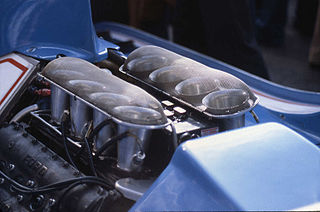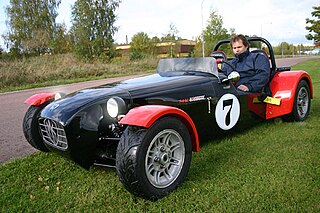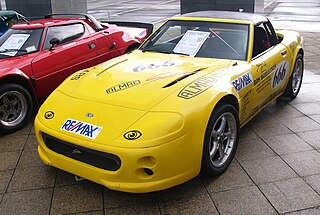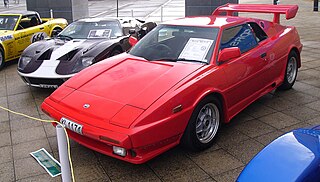
A Locost is a home-built car. The car features a space frame chassis usually welded together from mild steel 1 in × 1 in square tubing. Front suspension is usually double wishbone with coil spring struts. The rear is traditionally live axle, but has many variants including independent rear suspension or De Dion tube. Body panels are usually fiberglass nose and wings and aluminium side panels. Each car is highly individualized according to the resources, needs and desires of each respective builder.

A kit car is an automobile that is available as a set of parts that a manufacturer sells and the buyer then assembles into a functioning car. Usually, many of the major mechanical systems such as the engine and transmission are sourced from donor vehicles or purchased new from other vendors. Kits vary in completeness, consisting of as little as a book of plans, or as much as a complete set with all components to assemble into a fully operational vehicle such as those from Caterham.

Cosworth is a British automotive engineering company founded in London in 1958, specialising in high-performance internal combustion engines, powertrain, and electronics; for automobile racing (motorsport) and mainstream automotive industries. Cosworth is based in Northampton, England, with American facilities in Indianapolis, Shelby Charter Township, Michigan and Mooresville, North Carolina.

Lotus Cars is a British automotive company that manufactures sports cars and racing cars in its headquarters in Hethel, United Kingdom. Lotus cars include the Esprit, Elan, Europa, Elise, Exige and Evora sports cars and it had motor racing success with Team Lotus in Formula One. Lotus Cars are based at the former site of RAF Hethel, a World War II airfield in Norfolk. The company designs and builds race and production automobiles of light weight and fine handling characteristics. It also owns the engineering consultancy firm Lotus Engineering, which has facilities in the United Kingdom, United States, China, and Malaysia.
The Lotus Elite name has been used for two production vehicles and one concept vehicle from Lotus Cars. The first generation Elite Type 14 was produced from 1957 to 1963 and the second generation model from 1974 to 1982. The Elite name was also applied to a concept vehicle revealed in 2010.
Caterham Cars is a British manufacturer of specialist lightweight sports cars established in Caterham, Surrey, with their headquarters in Crawley, Sussex. Their current model, the Caterham 7, originally launched in 1973, is a direct evolution of the Series 3 Lotus Seven designed by Colin Chapman. In the 1990s the company made the Caterham 21, a two-seater soft top alternative to the MGF and Lotus Elise,. A track-only car, the SP/300.R, a joint project with Lola was released for customer testing in 2010 and was scheduled for release in 2013. On 27 April 2011, Team Lotus owner Tony Fernandes announced that he had purchased Caterham.

The Mazda RX-8 is a sports car manufactured by Mazda between 2002 and 2012. It was first shown in 2001 at the North American International Auto Show. It is the successor to the RX-7 and, like its predecessors in the RX range, it is powered by a rotary Wankel engine. The RX-8 began North American sales in the 2003 model year.

The Lotus Esprit is a sports car that was built by Lotus Cars at their Hethel factory in the United Kingdom between 1976 and 2004. It was among the first of designer Giorgetto Giugiaro's polygonal "folded paper" designs.

The Caterham 7 is a super-lightweight sports car produced by Caterham Cars in the United Kingdom. It is based on the Lotus Seven, a lightweight sports car sold in kit and factory-built form by Lotus Cars, from 1957 to 1972.

Robin Hood Engineering Ltd was a British kit car manufacturer based in Mansfield Woodhouse, Nottinghamshire. The factory covered 30,000 square feet (2,800 m2) and was on a one and a half acre site.

Formula 5000 was an open wheel, single seater auto-racing formula that ran in different series in various regions around the world from 1968 to 1982. It was originally intended as a low-cost series aimed at open-wheel racing cars that no longer fit into any particular formula. The '5000' denomination comes from the maximum 5.0 litre engine capacity allowed in the cars, although many cars ran with smaller engines. Manufacturers included McLaren, Eagle, March, Lola, Lotus, Elfin, Matich and Chevron.

MK Sports Cars was founded by Martin Keenan and has recently moved to Rayne, Essex. It offers the Lotus Seven style kit car MK Indy. The MK Indy is available in four different designs - these are the Indy, Indy R and Indy RR and more recently the RX-5. The kits offer the option of various engines from cars and motorbikes.

The Buckler Cars company founded by C. D. F. Buckler was based at 67 Caversham Road, Reading, Berkshire, England and produced approximately 400 cars between 1947 and 1962. In about 1947, Buckler took over the Welco Farm Implements Ltd at Crowthorne, Berkshire and a plaque can be seen on the site of the former factory.
The Lotus Esprit GT1 was a sports racing car produced by Lotus Engineering, a subsidiary of Lotus Cars formed to develop racing cars to compete in the GT1 class racing. It competed in the BPR Global GT Series in the mid 1990s.
Mills Extreme Vehicles (MEV) is a kit car design and manufacturing company based in Mansfield, Nottinghamshire, England, founded in 2003. As of January, 2016 they manufacture the Exocet, an exoskeletal design and the Replicar, a full-body design inspired by the 1950s Aston Martin DBR1. Both cars use donor parts from the Mazda MX5 Mk1 sports car. An enhanced version of the Exocet, the MX150R, can participate in UK race series regulated by the 750 Motor Club and the MSA.

Almac is a New Zealand based kit car company founded in 1984 and located in Upper Hutt. Almac cars is a part of Almac Reinforced Plastics Ltd fibreglass product manufacturing a company founded in 1971 by Alex McDonald. McDonald's interest in kit cars started while he was living in England, having purchased a Jem Marsh Sirocco. Jem Marsh founded the Marcos car company.

Heron Cars were racing cars, sports and kit cars built in New Zealand between 1962 and 1999 by Ross Baker. They also included a one-off electric car.
Microplas Limited was formed in 1954 in Uxbridge by group of 750 Motor Club members. They were Mike Eyre, Roger Everett, Bill Ashton, Sandy Wemyss, Tony Wemyss, and one other who was associated with the Hunting family. The Huntings were among the first to make reinforced plastics for the British military during World War Two. Microplas had access to this technology. The Mircroplas also traded as Microbond.

New Zealand had a long history of small garages and vehicle enthusiasts modifying and creating sports and sports racing cars. Out of these interests grew the New Zealand kit and replica car industry with the introduction of fibre-glass car bodies in the 1950s.
















